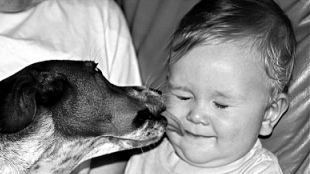 FLICKR, CREATIVE COMMONS, JEN DEVERE WARNER
FLICKR, CREATIVE COMMONS, JEN DEVERE WARNER
The microbiome of dust from homes with dogs is distinct from that of non-pet homes, and now it appears this unique bacterial assemblage may confer an advantage to the youngest members of the household. Mice fed dog-home dust before being exposed to the common infant infection respiratory syncytial virus (RSV), which is associated with a high risk of developing asthma, appear to be immune to the virus compared to mice fed on normal house dust.
The immune mice also had “a distinct gastrointestinal bacterial composition,” Kei Fujimura, part of the team from the University of California that announced its findings at the American Society for Microbiology General Meeting last month (June 19), told Wired Science.
This suggests that certain microbes carried by dogs may take ...



















